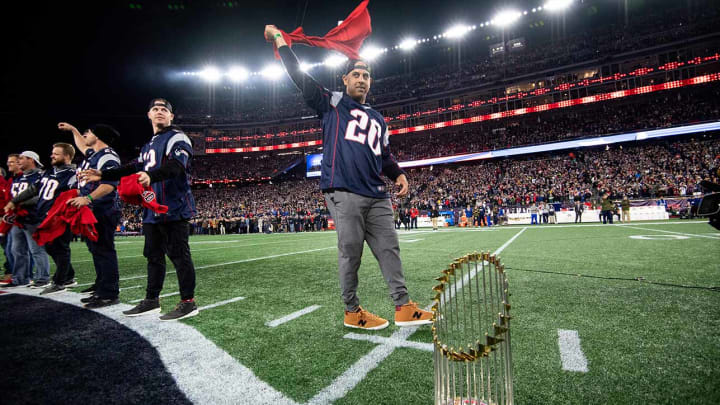Alex Cora Reflects on Rovers, Year One With the Red Sox and Reveling in a World Series Win

Starters are often placed into playoff games where the season lays in the balance, but rarely has the strategy been employed as frequently as Alex Cora used it this fall. Cora’s “rover” strategy helped lead the Red Sox to World Series glory.
Throughout the season, the eighth inning had proved problematic for Boston, particularly in the second half. As soon as the postseason began, the team’s first-year manager began to insert starting pitchers in relief to preserve the lead for closer Craig Kimbrel.
“That’s the willingness of the players, their athletic ability, and knowing they were going to be able to bounce back no matter how much we used them,” says Cora. “We talked about that with the medical staff, they were a big part of it and preparing them.”
The rookie Red Sox manager, who compiled a combined 119 wins between the regular season and postseason, first used his “rover” strategy in Game 1 of the American League Division Series, dispatching Rick Porcello for the eighth inning against the Yankees. Cora then went back to it in Game 4, using Chris Sale in the eighth. He used Porcello again in a Game 2 victory in the ALCS against the Astros and Nathan Eovaldi as a four-out bridge to the ninth inning in the pennant-clinching Game 5 in Houston.
Eovaldi also pitched the eighth in the opening two games of the World Series against the Dodgers, and Cora called upon ace Chris Sale for the final three outs to close out the series in Dodger Stadium.
“They made it look easy, but it wasn’t that easy,” says Cora. “In the end, it’s all about the players. They’re very talented. It’s just a matter of putting them in situations where they would be successful.”
Cora’s weekend included a World Series celebration in Puerto Rico, an on-field appearance during the Sunday night Patriots-Packers game and a night with his players at Pedro Martinez’s foundation gala. Martinez’s foundation is centered around improving the lives of children in the Dominican Republic and the United States. With his daughter by his side, Cora spoke about the significance of Martinez’s event.
“We know as a team there are more important things than baseball, and it’s a blessing to be here together,” Cora said. “Baseball is a game, but there are other things more important, like the work of this foundation.
“Never limit yourself. That’s the most important thing. I never limited myself. Luckily for me, the outcomes have been positive. That doesn’t mean that it’s always going to be positive. When you leave your home, you always leave it to seek better opportunities. And the key to success is to not limit yourself or think that you can’t do better. That’s what I’ve done, and it’s worked out pretty well.”
This championship marked the third for Cora, who also won as the bench coach for the Astros last season and as a player in 2007 for the Red Sox. Cora served largely as a utility infielder that season, watching in awe as second baseman Dustin Pedroia helped power the team to a title.
Pedroia only played three games in the 2018 season due to a chronic knee injury, but Cora noted that his former teammate was an asset to the club.
“He’s an outstanding teammate,” said Cora. “I played with him two years in ’07 and ’08, and I know the type of person he is. If he can’t contribute on the field, he’ll find ways to contribute off the field. He wasn’t the only one—Tyler Thornburg, too. There were a lot of guys that weren’t able to contribute on the field but they did an outstanding job off the field.”
There are offseason question marks for the Red Sox, including who will serve as the team’s closer with Kimbrel entering free agency, but for now, Cora prefers to enjoy the ongoing championship celebration.
“I’m celebrating,” said Cora. “That’s all that matters at the moment. I’ll slow down and chill once I get home, and I’ll think about the great things that happened this year, but right now, we’re still celebrating.”
Cora touched on the difference between celebrating as a player and a manager.
“I enjoyed it as a player and I enjoyed it as a manager, but it’s a lot different,” said Cora. “It’s two different feelings. When you’re a player, you’re there to enjoy yourself. As manager, you’re there to lead a group of men to the promised land. This was something we set as a goal, and to see it accomplished is a great feeling.”
